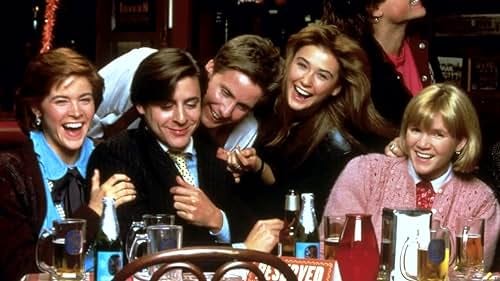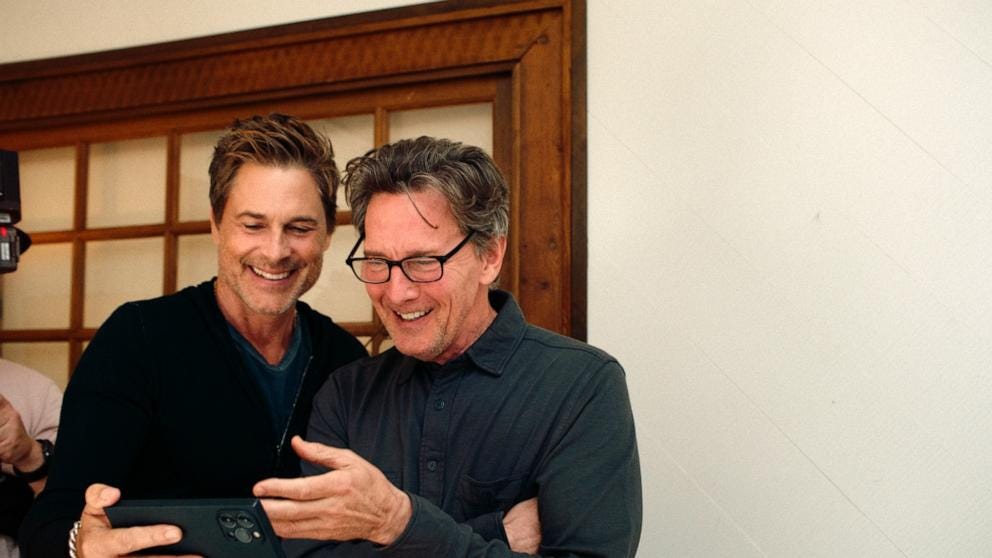Gen Xers don’t like 'Brats' because it’s so Gen X
Andrew McCarthy’s prickly, earnest film reflects a bygone time.
Andrew McCarthy has made a documentary called “Brats,” and many Gen Xers don’t seem to be happy with it. Perhaps they went in expecting that the star of “St. Elmo’s Fire” and “Class” would make an affectionate, nostalgic film about his days among the cadre of young ‘80s stars known as the “Brat Pack.”
Instead, McCarthy has a score to settle.
For nearly 40 years, McCarthy (who also wrote the memoir “Brat”) has been chafing over being dubbed part of the “Brat Pack,” and over the snarky 1985 New York magazine article that coined the term. In “Brats,” which premiered last week on Hulu, McCarthy takes his camera to visit fellow BPs like Demi Moore, Rob Lowe, Emilio Estevez and Ally Sheedy to ask them all a variation on one question: “Wasn’t that terrible?”
Generation X fans expected a warm and fuzzy movie, perhaps culminating in a roundtable interview where Andy Cohen peppers the actors with softball questions designed to make them weep. Instead, McCarthy and his film come off as prickly, earnest, cynical, and self-involved.
A lot like how many would describe Generation X.
As a Generation Xer myself, I find “Brats” so much more fascinating because it doesn’t feed the era through the Hollywood nostalgia machine, buffing the surfaces and smoothing the edges into something easily digestible and disposable. Fascinatingly, hilariously and sometimes poignantly, it is an authentic expression of the mindset of a bygone time. Even if its creator isn’t necessarily aware of it.
(Photos courtesy of Hulu/ABC News)
While Nelson seemed to aspire to be the Marlon Brando of the Brat Pack, and Lowe to be its Warren Beatty, McCarthy seemed to style himself as a latter-day Dustin Hoffman. He was a New Yorker when most of the group lived in L.A., a serious stage actor who went to NYU and acting school when most of the others didn’t.
Perhaps that’s why he seems so put off by the “Brat Pack” label, and convinced that it stunted his acting career afterwards. (To which I say: Dude, you went on to star in “Mannequin” and BOTH “Weekend at Bernie’s” movies, something that goes unmentioned in your documentary. You might want to look there for clues why your career stalled out.)
But it’s that delusion, and his inability to get over such a minor slight for decades (the New York article wasn’t even directly about him, but Estevez), that makes McCarthy such a compelling character. If he didn’t exist in real life, Alexander Payne would have to write him.
There’s something so funny to me about him visiting stars like Estevez and Lowe in their multi-million dollar homes and attempting some sort of shared trauma therapy with them. The reactions from his former castmates are varied, but unfailingly kind.
Estevez seems wary and guarded, Lowe seems perfectly happy and grateful for the experience in a very Chris Traeger way, and Moore comes off so thoughtful and insightful, having done the emotional work on herself that McCarthy should have done decades ago. Also, it was delightful to see Sheedy again on camera after so long, looking so happy and at peace.
After hearing all these different responses, McCarthy goes back to his rental car and tells the camera that they all experienced exactly the same thing. Which is absolutely not true, and so telling that he needs to perceive it that way.
And, I have to say, I found it quite relatable. I can’t be the only middle-aged person who still occasionally thinks about slights and mistakes that happened in high school and college, 35 or 40 years ago. But I’m sure if I brought them up to the other people who were there, they’d look at me with total bafflement and say “What are you talking about?”
The footage of the Brat Packers in their heyday, like the photos from our high school and college years, look like they were shot on another planet, populated by totally different people. So why do they still have such a hold on us?
McCarthy’s “white whale” at the end of the movie is to interview journalist Dave Blum, who wrote the notorious New York article. It’s unclear if McCarthy goes in expecting an apology or whatever, but Blum to his credit sticks to his guns. He doesn’t get defensive, instead being proud of the article and its impact on the culture, attributing the excessive meanness of some lines to the “wild swings” of youth.
In the end of the film, McCarthy seems more at peace with the “Brat Pack” label, or at least has a better appreciation for the impact that the “Brat Pack” movies had on their generation.
There’s certainly a more comprehensive, straightforward documentary to be made about that era in film, a youth-obsessed time whose reverberations are still felt today. But I’m strangely grateful for the personal, testy perspective that McCarthy brings to “Brats.” It keeps the Gen X spirit alive, flaws and all.




You are so ridiculously spot on with your commentary here. I’m Gen X and watched it with some high school friends - we thrived on John Hughes movies and still quote them on the daily, 40 years later.
I got frustrated with Andrew McCarthy’s ignorance in recognizing the problem was just a “you problem”. I was screaming at the TV “listen to her!!!” with just about everything Demi said.
And I did the same with Rob Lowe.
I couldn’t help feeling by the end of the talk with Emilio Estevez that he just wanted Andrew to shut up and leave his house.
And this is why I’m Gen X. And why your article is brilliant.
Thank you.
Andrew McCarthy memoir: “Brat”
His doc: “Brats”
And yet he says he hates the term “Brat Pack.”
Gotta appreciate the combo of cash grab and kvetch about the source of said grab. 😜